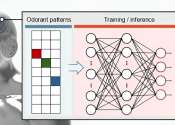Macrophages in the artery wall 'smell' their surroundings
An artery is not like a nose. Or is it?
Jan 13, 2022
0
84
An artery is not like a nose. Or is it?
Jan 13, 2022
0
84

Taste is a complex phenomenon. We do not experience the sensation through a single sense (as we would when we see something using our sense of sight, for example) but rather it is made up of the five senses working together ...
Apr 11, 2019
0
3

Several years ago the internet was captivated by the enigma of "the dress—specifically, was the dress black and blue, or was it white and gold? No matter what you saw, the viral debate served to highlight that humans differ ...
Apr 30, 2019
0
85

By adolescence, your brain already contains most of the neurons that you'll have for the rest of your life. But a few regions continue to grow new nerve cells—and require the services of cellular sentinels, specialized ...
Apr 6, 2016
0
105

In animals, numerous behaviors are governed by the olfactory perception of their surrounding world. Whether originating in the nose of a mammal or the antennas of an insect, perception results from the combined activation ...
Aug 31, 2015
2
114

A team of chemical and biological engineers at Seoul National University in the Republic of Korea has developed a proof-of-concept device that could one day lead to the creation of an artificial nose.

2020 was a doozy of a year, to say the least! As 2021 continues to transition us out of the COVID-19 pandemic thanks to global public health efforts, we are often left with questions about the lingering health effects of ...
Jun 29, 2021
0
2

The olfactory sensory neurons in the nasal mucosa perceive the myriad smells in the air with the aid of odorant receptors. Each sensory neuron chooses one and only one receptor gene for expression. The probability that a ...
Nov 11, 2011
0
0

If you can tell the difference between a merlot and a cabernet franc just by smell, it's probably all in the timing.
Sep 17, 2018
0
56

Research at the RIKEN Brain Science Institute in Japan has revealed that a molecule involved in fish reproduction activates the brain via the nose. The pheromone is released by female zebrafish and sensed by smell receptors ...
May 30, 2016
2
41
